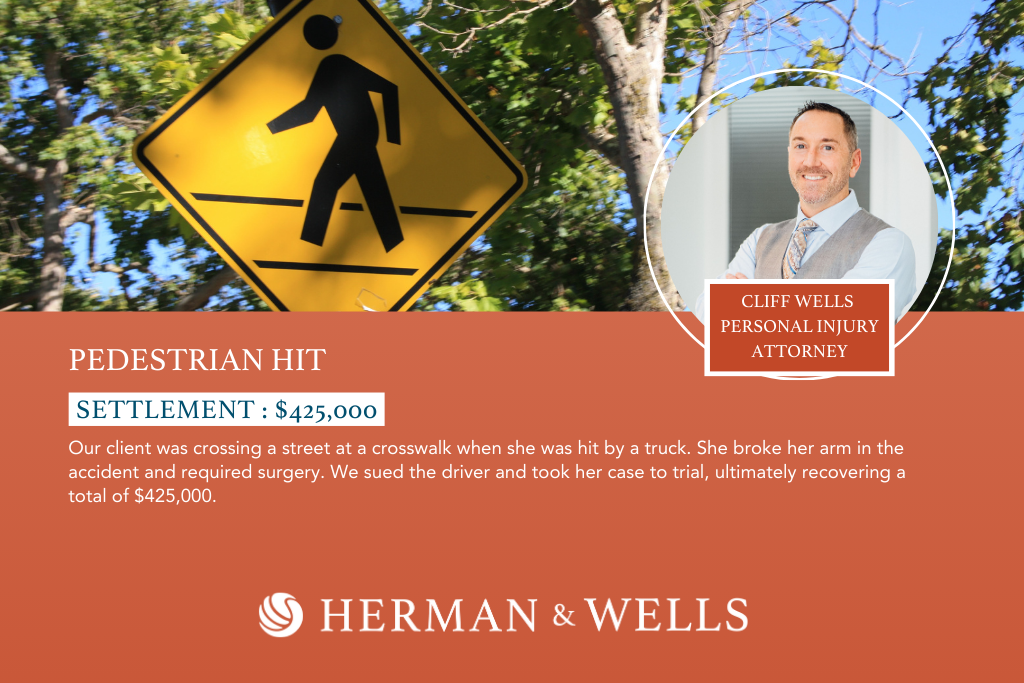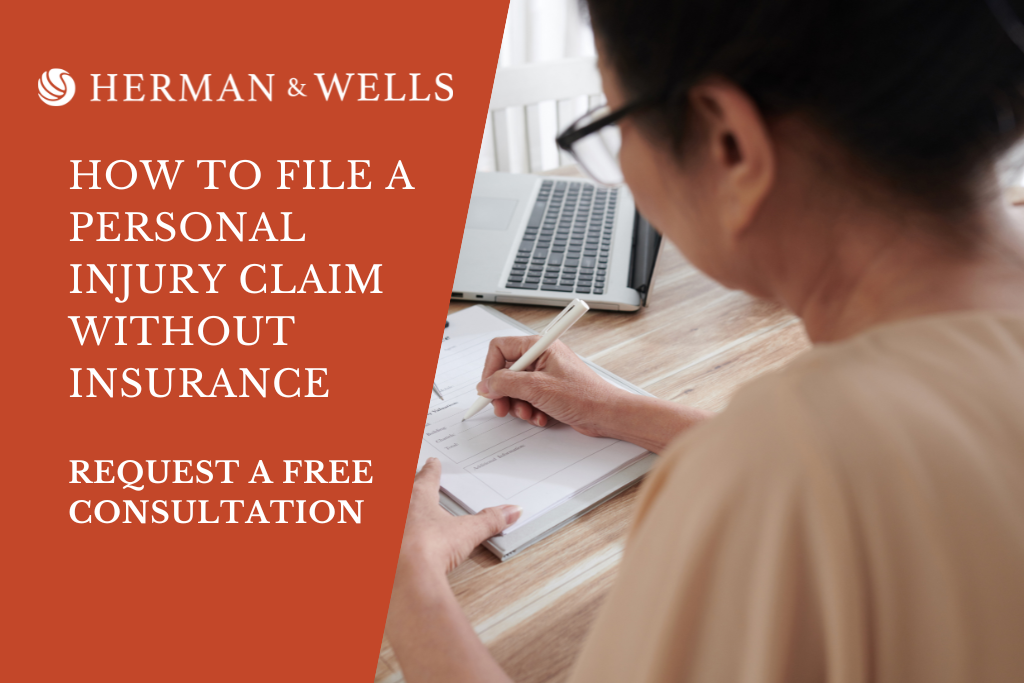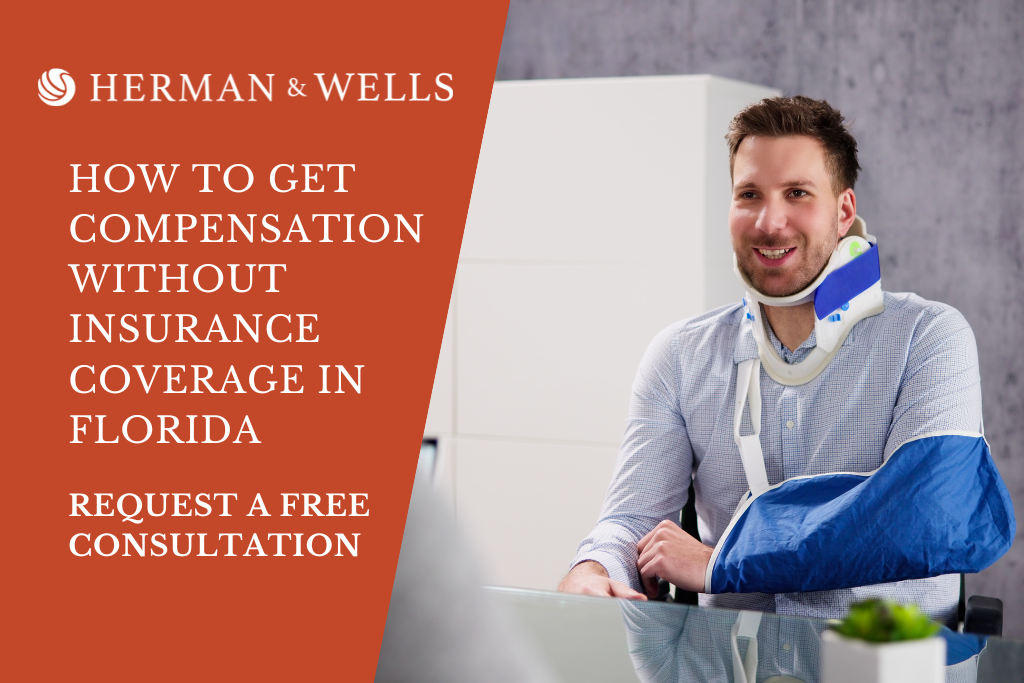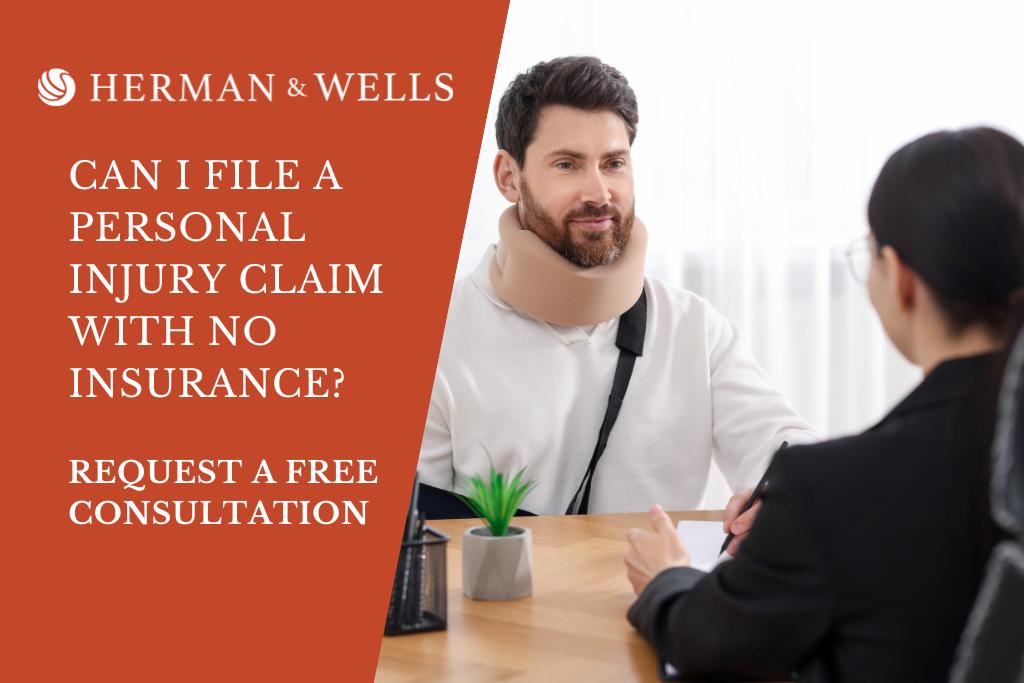As pedestrians in Florida, we understand the risks associated with using crosswalks. From busy intersections to unmarked roadways and fast-moving traffic, it can be easy to put ourselves in dangerous situations while trying to get from point A to point B. Unfortunately, not all pedestrian accidents are avoidable.
If you’ve been injured after being hit by a car or truck while crossing a street on foot, you know what it feels like to experience an unexpected scare—or worse—a life-altering trauma due to someone else’s negligence.
Aside from searching for legal representation and proper medical care following your accident, there is more you should consider when navigating roads as a Florida pedestrian in order to keep yourself safe and reduce your risk of injury. The knowledge found within this blog post will give you the resources necessary for making informed decisions about when and where it’s okay (and not okay) for you to cross the street.
If you or a loved one have been injured in a pedestrian accident, the personal injury attorneys at Herman & Wells may be able to help you. Our knowledgeable legal team has years of experience fighting for the rights of Floridians who have been wrongfully injured and lost wages due to someone else’s negligence. We understand that filing a claim and navigating the legal system can be complex, but rest assured that our team has your best interests in mind.
Contact us today and tell us your story!
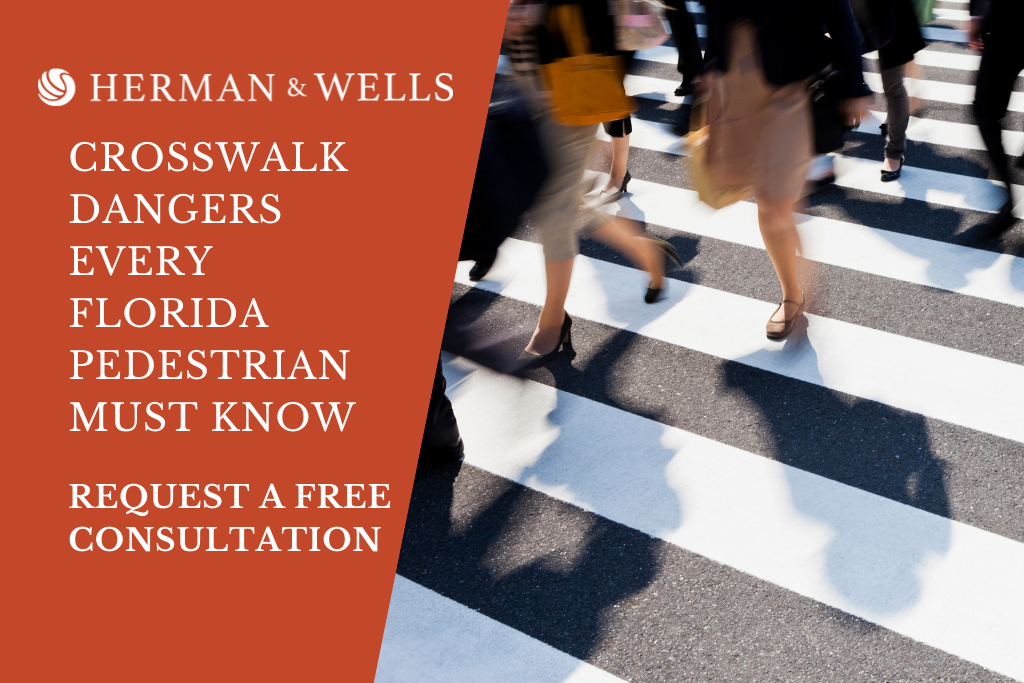
The Cliff Notes: Key Takeaways From This Post
- 1Florida is one of the most dangerous states for pedestrians, with nearly 3,000 deaths resulting from pedestrian-related accidents since 2008.
- 2Pedestrians have the right of way when crossing the street at a controlled intersection, marked or unmarked crosswalks, or any other place providing safe passage across the street.
- 3Common causes of crosswalk accidents in Florida include distracted driving, driver fatigue, intoxicated driving, and poor road conditions.
- 4Pedestrians should always exercise caution and be aware of their own safety when crossing streets or entering an intersection or a marked crosswalk.
- 5To stay safe while using Florida crosswalks pedestrians should make sure they have the right-of-way, be mindful of their surroundings, and increase their visibility.
- 6If someone has been injured in a pedestrian accident, they should seek medical attention and file an official police report before speaking to an attorney who specializes in pedestrian accidents.
Statistically, Florida Is A Very Dangerous Place For Pedestrians
Unfortunately, Florida is one of the most dangerous states for pedestrians in the entire country. According to the National Highway Traffic Safety Administration, nearly 3,000 people have been killed in pedestrian-related accidents across the state since 2008.
Crosswalk Laws In Florida
Crosswalk laws vary from state to state, and Florida is no exception. The most important law for pedestrians in Florida is the Pedestrian Control Signal Law. This law states that a pedestrian facing a green signal must cross the roadway when it is safe to do so, while pedestrians facing a red signal must not cross the roadway unless they have safely reached the median or curb.
Pedestrians in Florida have the right of way when crossing the street at a controlled intersection, marked or unmarked crosswalks, or any other place providing safe passage across the street. This means that drivers must yield to pedestrians who are waiting to cross, as well as those who are already in the middle of crossing. Drivers must also make sure that they come to a complete stop before turning right or left while pedestrians are in the crosswalk.
In addition, drivers have an obligation to exercise due care to avoid hitting a pedestrian regardless of the circumstances. This means that even if a pedestrian is not in a crosswalk, a driver must still be cautious and watch out for pedestrians in order to avoid an accident.
Failing to follow the rules of the road can lead to serious consequences for drivers and pedestrians alike. Drivers who fail to yield or exercise due care may face fines, points on their license, or jail time. Pedestrians who are hit by vehicles may suffer severe injuries and in some cases, death.
Common Causes Of Crosswalk Accidents In Florida
It is important to be aware of common causes of crosswalk accidents so that you can take steps to protect yourself when walking near traffic.
Distracted Driving
One of the most common causes of crosswalk accidents in Florida is distracted driving. Motorists who fail to observe pedestrian crossings and fail to yield the right-of-way can cause serious injury or death when they collide with a pedestrian. Drivers are expected to adhere to proper safety protocols, including slowing down and yielding to pedestrians at intersections and marked crosswalks.
Driver Fatigue
Another common cause of crosswalk accidents in Florida is driver fatigue. When a motorist is tired, they may be less attentive and more likely to miss pedestrians crossing at intersections or marked crosswalks. Drivers should ensure that they get enough rest before getting behind the wheel so that they can remain alert while driving.
Intoxicated Driving
Another cause of crosswalk accidents is alcohol use. Alcohol impairs a driver’s ability to make good decisions and can lead to them not seeing or hearing pedestrians in crosswalks. Drivers should never get behind the wheel if they have been drinking.
Poor Road Conditions
Finally, poor road conditions can cause crosswalk accidents in Florida. Poorly maintained roads, inadequate lighting, and lack of crosswalk signs can all contribute to motorist confusion and lead to accidents involving pedestrians.
In addition to motorists, pedestrians can be responsible for crosswalk accidents in Florida. Even when crossing at an intersection or marked crosswalk, pedestrians must exercise caution and be aware of their own safety.
Unsafe Walking Practices
Pedestrians should always stay in the designated crosswalk when crossing the street, and should never enter traffic without looking both ways. Pedestrians must also be aware of their surroundings at all times and use caution when entering an intersection or marked crosswalk. It is also important to remember that pedestrians have the right-of-way over vehicles at intersections and marked crosswalks.
By being aware of the common causes of crosswalk accidents in Florida, you can take steps to protect yourself when walking near traffic. You should always remain alert and use caution when crossing streets or entering an intersection or marked crosswalk, as drivers may not be paying attention or following road rules.
How To Stay Safe While Using Florida Crosswalks
Whenever you can, always use a marked or unmarked crosswalk instead of jaywalking. This will ensure that drivers are more likely to spot you and take extra caution when approaching. Unfortunately, there is still a risk of pedestrian accidents when using a crosswalk. Here are some tips to help you stay safe while crossing the road:
1. Make Sure You Have The Right-of-Way
In Florida, pedestrians have the right-of-way when crossing a street at a marked or unmarked crosswalk. Make sure that you only enter the crosswalk when vehicles have stopped and that it is safe to do so.
2. Be Mindful Of Your Surroundings
Keep an eye out for vehicles turning right on red or making left turns over the crosswalks, as they often don’t see pedestrians. Be aware of your surroundings and try to make eye contact with drivers before crossing the road.
3. Increase Your Visibility
If you need to cross the street at night, make sure you wear bright and reflective clothing so that drivers can see you more easily. Try carrying a flashlight or other type of light source if possible.
4. Follow Traffic Signals
Always obey all traffic lights and signals when crossing the street at a crosswalk. Even if the coast looks clear, it’s important to follow the law and wait until you have the right-of-way before crossing.
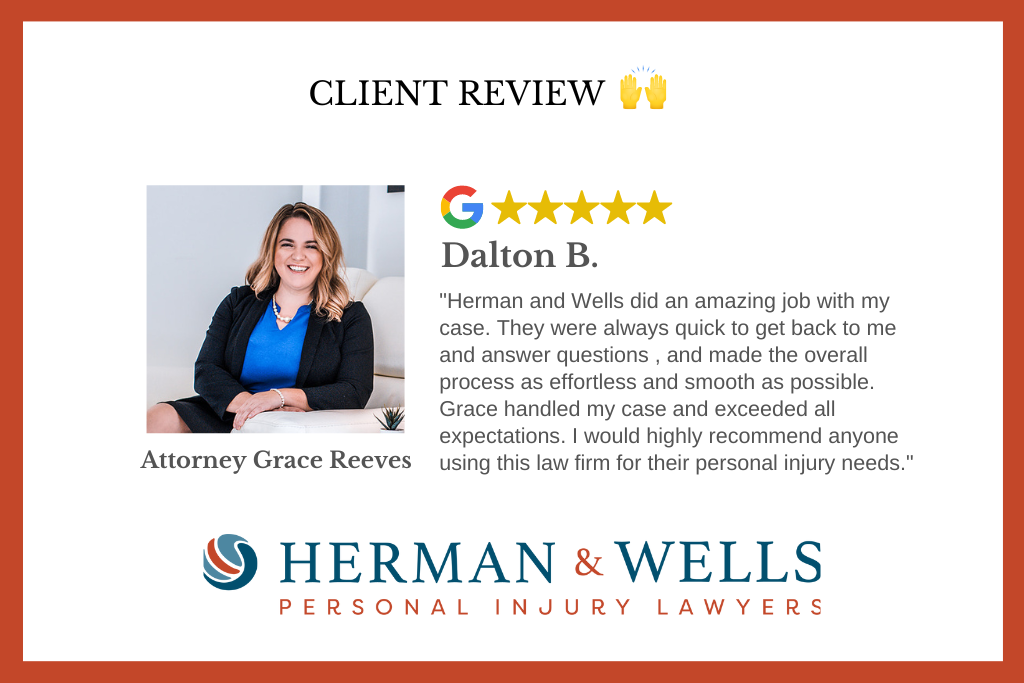
Crosswalk Injury? What To Do Following A Pedestrian Accident
If you or a loved one has been injured in a pedestrian accident, it’s important to take certain steps to ensure your rights are protected. Here are some tips on what to do after a crosswalk accident:
Seek Medical Attention
Even if you don’t think you were seriously injured, it is always important to seek medical attention. In some cases, the symptoms of a more serious injury may not be immediately apparent. This will help ensure that any potential internal injuries or long-term health complications are identified and treated as soon as possible.
It is also important to file an official police report of the incident. This document will provide key details about the accident and can be used as evidence should you decide to seek legal action.
File An Accident Report
If you were involved in a pedestrian accident, make sure that you file an official police report as soon as possible. This document will provide important details about the incident and can play a critical role if you decide to seek legal action.
Gather Evidence
If possible, take photos and videos of the scene and make sure to collect the contact information of any drivers or witnesses involved in the accident. This will help establish liability should your case go to court.
Speak With A Pedestrian Accident Attorney In Florida
The next step is to speak with an attorney who specializes in pedestrian accidents. An experienced lawyer can help you understand your rights and ensure that you receive the compensation you deserve for any pain, suffering or property damage caused by the accident.
Need To Speak To A Florida Pedestrian Accident Attorney?
Remember, safety first – make sure to use crosswalks whenever possible and obey all traffic signals and laws. Make sure to be mindful of your surroundings and increase your visibility at night. Taking these steps will help keep you safe when crossing the street.
If you have been injured in a pedestrian accident in Florida, contact the experienced personal injury lawyers of Herman & Wells as soon as possible. With their help, you can make sure your rights are fully protected and that you get the compensation that is owed to you. Call (727) 821-3195 for a free consultation today!
